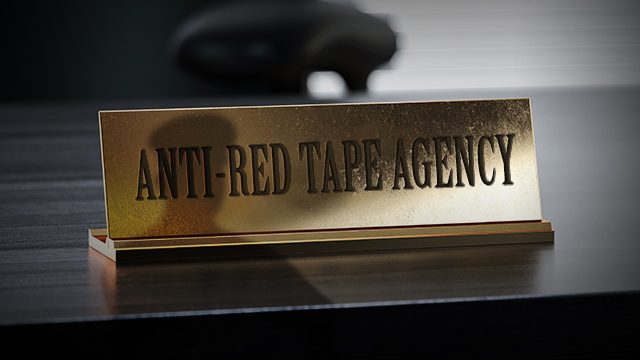SUMMARY
This is AI generated summarization, which may have errors. For context, always refer to the full article.

MANILA, Philippines – President Rodrigo Duterte wants a retired general to head a new Anti-Red Tape Agency (ARTA) to hasten processes in government and business transactions, Department of Trade and Industry secretary Ramon Lopez said on Wednesday, June 13.
“There will be more teeth into this new organization…maybe literal or symbolic, na kailangan talagang bastonero [we need a hitter],” Lopez said.
Lopez said ARTA “has to be under the Office of the President,” and must act as a “super-agency”.
“It cannot be handled under the DTI, which is co-equal with the other departments, The President wants a single agency that can direct other agencies,” Lopez added.
Duterte has appointed many former military and police officials in government. Some of them are Defense Secretary Delfin Lorenzana, National Food Authority Administrator Jason Aquino, Agrarian Reform Secretary John Castricciones, Interior and Local Government Officer-in-Charge Catalino Cuy, and Drug Enforcement Agency Director General Isidro Lapeña.
Duterte recently signed Republic Act 11032 or the Ease of Doing Business and Efficient Government Service Delivery Act of 2018, which aims to improve the country’s competitiveness. (READ: Dip in Philippine competitiveness ranking a ‘wake-up call’ – business leaders)
Agency structure
RA 11032 specified that ARTA will be the lead agency to “implement various ease of doing business and anti-red tape reform initiatives.” (READ: Philippines slips 9 notches in competitiveness ranking)
ARTA will also have the capacity to investigate and file cases against agencies or individuals that bog down efficiency or engage in illegal activities.
The agency will be headed by a Director General, who will be co-terminus with the tenure of the President.
The law also specified the creation of an “Ease of Doing Business and Anti-Red Tape Advisory Council,” to be headed by the DTI secretary. The ARTA director general will act as vice-chairperson, while the secretaries of the Department of Information, Communication and Technology (DICT), Department of the Interior and Local Government (DILG), and the Department of Finance (DOF) will act as members.
Meanwhile, private sector representatives for the council will be appointed by the President and will stay in their posts for 3 years.
Key features
The law aims to hasten government and business transactions by implementing the following:
Streamlining – The law mandates the use of a single form for entrepreneurs to fill out. The form covers transactions like local taxes, sanitary permit, various clearances, and other requirements. There will also be a unified form for business permits and business renewals.
One-stop shop and automation – Entrepreneurs will now only have to visit just one facilty for the processing of their applications. Local governments are mandated to put up a “one-stop shop” and automate all transactions. All data will be received by the DICT, which will establish a central business portal. The DICT will also create a databank of all registered businesses in the country.
Standard deadlines – Simple transactions with government agencies should be processed within 3 working days, 7 working days for complex transactions, and 20 days for highly technical transactions. These highly complex transactions include activities which pose danger to public health, safety, public morals, and public policy. The maximum time prescribed will be extended only once for the same number of days. (READ: Duterte to frontline services: Answer requests in 15 days)
Limitation of signatories – The law limits the number of signatories in any document to only 3 officers, who directly supervise the agency concerned. Electronic signatures may also be used.
Penalties
The law has very harsh penalties against fixers. For instance, the first offense with just an administrative liability will merit a 6-month suspension for employees.
Perpetual disqualification from holding public office, forfeiture of retirement benefits, and imprisonment of 1-6 years will be imposed on second-time offenders.
Senator Miguel Zubiri, one of the proponents of the law, said that there will also be a reward system to reinforce good practices in various agencies.
“There has to be penalties so that people will be on their toes all the time, but we need to recognize those who are doing very well,” Zubiri said. – Rappler.com
Add a comment
How does this make you feel?
There are no comments yet. Add your comment to start the conversation.